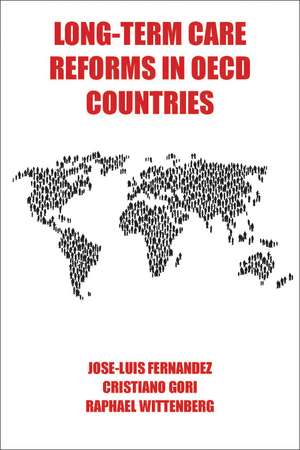Long-Term Care Reforms in OECD Countries
Editat de Jose-Luis Fernandez, Cristiano Gori, Raphael Wittenbergen Limba Engleză Hardback – 17 dec 2015
The past fifteen years have seen longterm care policies in the countries of the Organization for Economic Co-operation and Development (OECD) undergo substantial transformations, either through major policy reforms or through accumulated minor policy changes. This book brings together data from many OECD countries to compare key changes in national policies, examine the successes or failures of new approaches, and offer policy strategies for the future. Drawing on fifteen years of evidence and bringing together contributors from a number of perspectives throughout the OECD, it will be essential for those studying—or making—policy.
Preț: 781.65 lei
Preț vechi: 1015.13 lei
-23% Nou
Puncte Express: 1172
Preț estimativ în valută:
149.57€ • 156.56$ • 124.49£
149.57€ • 156.56$ • 124.49£
Carte tipărită la comandă
Livrare economică 31 martie-14 aprilie
Preluare comenzi: 021 569.72.76
Specificații
ISBN-13: 9781447305057
ISBN-10: 1447305051
Pagini: 320
Ilustrații: 16 black & white illustrations, 27 black & white tables
Dimensiuni: 152 x 229 x 25 mm
Greutate: 0.68 kg
Editura: Bristol University Press
Colecția Policy Press
ISBN-10: 1447305051
Pagini: 320
Ilustrații: 16 black & white illustrations, 27 black & white tables
Dimensiuni: 152 x 229 x 25 mm
Greutate: 0.68 kg
Editura: Bristol University Press
Colecția Policy Press
Notă biografică
Jose-Luis Fernandez is deputy director and principal research fellow in the Personal Social Services Research Unit (PSSRU) at the London School of Economics and Political Science and cochair of the International Long-Term Care Policy Network. Cristiano Gori is visiting senior fellow in PSSRU at the London School of Economics and Political Science and professor of social policy at the Catholic University in Milan. Raphael Wittenberg is a principal research fellow in PSSRU at the London School of Economics and Political Science and deputy director of the Centre for Health Service Economics and Organisation at the University of Oxford.
Cuprins
List of tables and figures
Notes on contributors
1. Introduction
José-Luis Fernández and Cristiano Gori
Part One: Funding
2. Demand for care and support for older people
Raphael Wittenberg
3. The long-term care financing problem
José-Luis Fernández and Pamela Nadash
Part Two: Models of care
4. How different countries allocate long-term care resources to users: a comparative snapshot
John Campbell, Naoki Ikegami, Cristiano Gori, Francesco Barbabella, Rafal Chomik, Francesco d’Amico, Holly Holder, Tomoaki Ishibashi, Lennarth Johansson, Harriet Komisar, Magnus Ring and Hildegard Theobald
5. How different countries allocate long-term care resources to older users: changes over time
Cristiano Gori, Francesco Barbabella, John Campbell, Naoki Ikegami, Francesco d’Amico, Holly Holder, Tomoaki Ishibashi, Lennarth Johansson, Harriet Komisar and Hildegard Theobald
6. Commissioning long-term care services
Joanna Marczak and Gerald Wistow
7. Cash-for-care benefits
Barbara Da Roit, Blanche Le Bihan and August Österle
8. Policy instruments to promote good quality long-term care services
Juliette Malley, Birgit Trukeschitz and Lisa Trigg
Part Three: Carers
9. Developing a skilled long‑term care workforce
Francesca Colombo and Tim Muir
10. Policies to support informal care
Ulrike Schneider, Gerdt Sundström, Lennarth Johannson and María A. Tortosa
Part Four: Institutional actors
11. The relationship between social and health services in care for older people
Laurel L. Hixon
12. Multilevel governance and its effects on long-term care support
Hildegard Theobald and Elizabeth Ozanne
13. Conclusions: Looking ahead in long-term care policies
Cristiano Gori, José-Luis Fernández and Raphael Wittenberg
Index
Notes on contributors
1. Introduction
José-Luis Fernández and Cristiano Gori
Part One: Funding
2. Demand for care and support for older people
Raphael Wittenberg
3. The long-term care financing problem
José-Luis Fernández and Pamela Nadash
Part Two: Models of care
4. How different countries allocate long-term care resources to users: a comparative snapshot
John Campbell, Naoki Ikegami, Cristiano Gori, Francesco Barbabella, Rafal Chomik, Francesco d’Amico, Holly Holder, Tomoaki Ishibashi, Lennarth Johansson, Harriet Komisar, Magnus Ring and Hildegard Theobald
5. How different countries allocate long-term care resources to older users: changes over time
Cristiano Gori, Francesco Barbabella, John Campbell, Naoki Ikegami, Francesco d’Amico, Holly Holder, Tomoaki Ishibashi, Lennarth Johansson, Harriet Komisar and Hildegard Theobald
6. Commissioning long-term care services
Joanna Marczak and Gerald Wistow
7. Cash-for-care benefits
Barbara Da Roit, Blanche Le Bihan and August Österle
8. Policy instruments to promote good quality long-term care services
Juliette Malley, Birgit Trukeschitz and Lisa Trigg
Part Three: Carers
9. Developing a skilled long‑term care workforce
Francesca Colombo and Tim Muir
10. Policies to support informal care
Ulrike Schneider, Gerdt Sundström, Lennarth Johannson and María A. Tortosa
Part Four: Institutional actors
11. The relationship between social and health services in care for older people
Laurel L. Hixon
12. Multilevel governance and its effects on long-term care support
Hildegard Theobald and Elizabeth Ozanne
13. Conclusions: Looking ahead in long-term care policies
Cristiano Gori, José-Luis Fernández and Raphael Wittenberg
Index
Recenzii
"I highly recommend this book to anyone who wants a deeper understanding of the problems of financing and providing long-term care in developed countries, as well as ideas for feasible solutions."
“With the increasing national and international interest in how to best match long-term care needs and provisions, this book offers learning and inspiration for a wide audience interested in the key policy lessons of comparative studies.”
